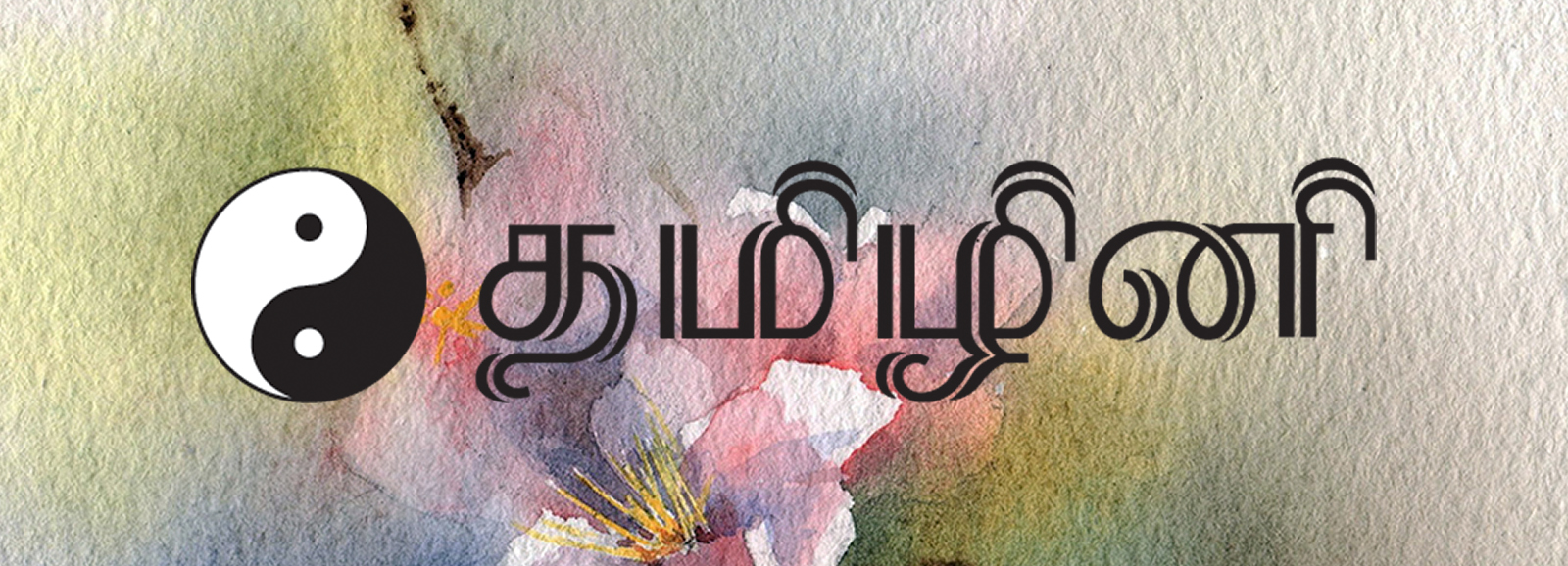To Read:
First Part: https://tamizhini.in/2018/11/14/the-ba-in-the-bapu-kannan-t/
Second Part: https://tamizhini.in/2019/01/13/the-ba-in-the-bapu-part-2-kannan-t/
Third Part: https://tamizhini.in/2019/02/17/the-ba-in-the-bapu-part-3-kannan-t/
Fourth Part: https://tamizhini.in/2019/03/18/the-ba-in-the-bapu-part-4-kannan-t/
(15)
Gandhi later headed off to the round table conference at London. When he returned as a disappointed man to Bombay on 28 December 1931, more arrests were awaiting him and the nation. He was arrested on January 4th, 1932. 75000 more arrests followed in January and February. 3 lakh to 4 lakh people were lathi-charged.
On the night of his arrest at Mani Bhavan, Bombay, Kasturba was with him. Her husband had just been back after a four month trip. She told him, ‘Please excuse me if I have offended you in any way.’ Mahadev Desai noted in his diary how Gandhi recalled this incident and joked about it at jail with Vallabhbhai Patel. “She said this with tears in her eyes. She was afraid we might never meet again on this side of the grave and was anxious not to die unforgiven.”
Verrier Elwin, who was staying with Gandhi that night, recorded his version of the events in his book, ‘The Tribal World of Verrier Elwin’:
Then Bapu stood up to take farewell. It was a strange sight: the police at the door, Mirabehn and Devdas bustling to and fro with the baggage which was already packed, Bapu surrounded by his friends, many of them weeping. Mrs. Gandhi with tears running down her cheeks said, “Can’t you take me with you?” Everyone in turn touched his feet, and when I said goodbye he pulled my ear with a smile. He was in very good spirits: he might have been going to a festival rather than a jail.
Then, followed by the whole company, he went downstairs. Shamrao and I watched from the roof. The tiny figure got into the car and the crowd surged round it. It was a wonderful tribute to India’s non-violence that there were only a few policemen and they were able to be in the midst of the crowd without fear of danger.
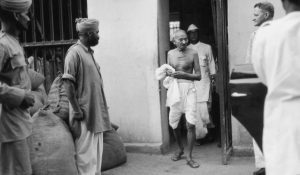
Kasturba was also arrested and released after a few weeks. Citing her speech at the trial for her first term, Gandhi wrote to Emerson, the Home Secretary:
Horses were run over an absolutely peaceful meeting in Ahmedabad. I observe that one of the injured boys has just died. I know some of the Ashram boys had severe injuries done to them. And I am glad that they had them rather than unknown boys or men. In Madras one youngster has succumbed to lathi blows. There they play hose pipes even on women. Two women are reported to have fainted through the force of the jet of water.
As Mrs. Gandhi is reported to have said justly at her trial, what is the use of women like her or men like Sardar Vallabhbhai and me being pampered prisoners when others who, being misled, as you would say by us, break laws and suffer lathi blows or worse? I do really think that there is much in what The Daily Express says when it suggests that I as the author of “all this mischief” should be sent to the gallows.
[January 27, 1932]
Kasturba, along with Maniben Patel, had gone round the villages of Gujarat addressing meetings. When she was arrested, she was sentenced to be put in Sabarmati jail for six weeks. The other members of her group were sentenced to three and a half months’ rigorous imprisonment and a fine of Rs. 100 or two months’ further imprisonment in case of default. Kasturba asked the Magistrate, “Why this discrimination? Why only one and a half month’s simple imprisonment for me? Do you want me to come again to teach my countrymen to receive lathi blows? I cannot bear coming out of jail, leaving my daughters behind I Can’t you award a similar sentence to me?” The Magistrate replied that he was helpless and the order could not be changed. She was ordered to be treated as an ‘A’ Class prisoner and all the facilities including the supply of a vernacular newspaper, Jam-I-Jamshed. She cheerfully underwent the term of imprisonment and spent her time spinning and reading. Five days after being convicted she was proud to learn that her son Ramdas had been arrested at Surat.
Gandhi, who was held again at the Yeravda Prison at Pune, had Mahadev and Vallabhbhai for company this time. On March 14th, Gandhi wrote a letter to Kasturba, telling her about his companions. But he started the letter in this strange manner, almost prodding her to court arrest: ‘For some days past I had been thinking of writing to you; and I read today that you were still out. And so I had a mind to write.’
Two days later, Kasturba was rearrested. He came to know of Kasturba’s arrest through the newspapers. Mahadev Desai noted in his diary:
“Yesterday we read the news that Ba had gone on a tour of the Bardoli Taluka (in Gujarat). Therefore I [Mahadevbhai ] said, ‘This time Ba will get six months (in jail).’
“Bapu (Gandhi) said, ‘It will not be a surprise if she gets class ‘C’ (jail) and is sentenced to hard labour.’
“Just then the same news appeared. On getting the news, Bapu’s joy knew no bounds. He laughed aloud. He then spoke only this much: ‘Was not the magistrate ashamed of awarding rigourous imprisonment to an old woman 60 years old? Vallabhai too should have been placed in C class.” The Sardar said: “I would be very happy if I was taken to the extension outside the prison walls.”
[March 16, 1932]
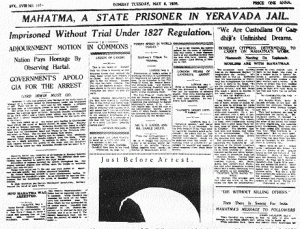
The next day’s newspapers reported that Kasturba was sentenced to a simple imprisonment for six months. She was held at the Sabarmati jail. Gandhi continued to track her imprisonment and the reactions to it from his prison cell.
The London letter in today’s Leader was excellent. Polak generally is over-moderate, but this time he has written strongly about events in India, such as Ba being given Class C and then A, and an eighty-year old woman being arrested in Karachi. “Ba is Bapu’s wife; therefore she was promoted to A class. Any other 60 year old woman in her place would have remained in C class. And Samuel is skating while all this is happening in India. Let Samuel beware lest the analogy of the caravan marching in spite of dogs barking recoils upon him and the Indian caravan marches so far the situation cannot be retrieved at all.”
Bapu said, “This is like what happened in the case of Phirozeshah Mehta. He did not think much of our struggle in South Africa, but when he heard about Ba’s arrest, his blood boiled and he delivered his famous speech in the Town Hall at Bombay. Polak too evidently could not bear the treatment accorded to Ba.”
Vallabhai said, “Not only Polak but every one else would have the same sort of feeling. Ba is the very image of ahimsa. I have not noticed such ahimsa on the face of any other woman. Ba’s humility and simplicity are astonishing.”
Bapu said, “You are right, Vallabhbhai, but Ba’s greatest virtue in my opinion is her courage. She is cross, she is angry, she is envious, but taking her whole career from South African days to date, it is her courage that is outstanding.”
[March 31, 1932]
Kasturba’s imprisonment moved people in a way even Gandhi’s imprisonment couldn’t. Polak was not entirely in favor of the Salt Satyagraha but his heart too underwent a change after hearing about the arrest of Kasturba.
A few months later, Gandhi wrote to Polak. On Kasturba, he said:
“She has aged considerably- in some respects perhaps more than I have. Spiritually she has made wonderful progress.”
Discussing various social issues with his prison mates, Gandhi thought about Kasturba many a time, in various contexts.
To a woman who asked why a widow should not be allowed to have Tilak on her forehead like married women as the soul was immortal, Bapu replied:
‘I am inclined to think that just as a widower does not bear upon his body any indication of the fact that he has lost his wife, so also a widow need not have any external marks indicating her condition. This opinion is grounded only in natural justice and not in the immortality of soul.”
I said, “Bapu, your poor correspondent is not aware that you are asking even married women not to have the mark on the forehead and not to wear bangles.’
Bapu replied, ‘I will tell her this if you like. But we must take our stand on the ground of justice only. So long as all married women have the forehead mark and wear bangles, how can I ask widows to discard these things? I argued and argued with Ba but failed to convince her. Formerly I held firmly to the view that widows should not remarry, and said that widowers too may not contract a second marriage. But then I noticed that widowers could not be prevailed upon to accept my advice. Therefore in justice perpetual widowhood cannot be enforced on widows.
[May 10, 1932]
Mathurdas writes from Nasik that he has written a play advocating divorce of which Kishor Lalbhai expresses appreciation. […]
To him (Mathurdas) Bapu replied as follows: I had never thought that you would write a play. Your thoughts are turning toward ultra-modern reforms. I do believe that within certain limits divorce should be permitted, but I would not at all care to propagate that idea. Generally we are such slaves of the psychological forces in us that no one will wager that his mind will be in the same state tomorrow in which it is today. I, therefore, feel even now that a marriage tie voluntarily entered into ought not to be broken without a very strong reason. If I had divorced Ba on the difference over untouchability, surely we would never have known the beautiful relation between us which exists today. Who can say in what condition Ba would be living and with whom I would have rushed into marriage? But the idea that there can be no divorce was ingrained in us, and so the crisis passed and only its memory is left now. I hope, therefore, that you have not advocated in your play unfettered freedom for a husband or a wife to divorce either party at will.
[June 18, 1932]
In a letter to Ramdas, while advising him on how he should treat his wife, Gandhi assessed his own behavior towards Kasturba, how it had evolved and where he saw it headed:
I like your vigilance. In this case, however, you should not be strict with Nimu. My ideas about the relations between husband and wife have changed of course. I would not like any of you to behave towards his wife as I did towards Ba. She has lost nothing through my strictness, of course, for I never regarded her as my property. I always had love and respect for her. I only wished to see her grow spiritually. However, she could not be angry with me, whereas I could with her. I did not give her the same freedom of action which I enjoyed and she did not have the capacity to exercise it either. Hindu women never have such capacity. That is a defect of Hindu society. I, therefore, wish that you should treat Nimu as having the same freedom which you have. I once wrote1 to her and asked her jestingly not to regard herself as dependent and harass you for every little thing. She replied saying that she was dependent and that you knew that it was so. The language is mine, but this is the meaning of what she said. This sort of dependence ought to be removed. If she wants a servant, why should she ask you? She can ask Narandas to provide one and may even quarrel with him on that issue. This is but a trivial example. She should, however, be free in matters which concern herself. If you wish to enjoy immoral pleasure with another woman, you will not be afraid of Nimu. That you may be held back by your love for Nimu is another matter. Similarly, Nimu should be free to enjoy immoral pleasure with another man without any fear. Mutual love may save a couple from sin, but there should be no fear of each other. I began to teach this [equality and freedom] only in the Ashram. My behaviour towards Ba at Sabarmati progressively became in line with this attitude, and the result was that she changed. Her old fear of me has disappeared mostly, if not completely. Even if I feel angry with her, I turn the anger on myself. The cause of anger is my attachment to her. This is an important change which has taken place in me and it has had beautiful results. The results will be more beautiful only if my love becomes purer still. Numberless women trust me spontaneously. I am sure that the reason of that is my love and respect for them. Invisibly they produce an effect all the time.
[11 August 1932]
Earlier, writing to Premabehn Kantak, he had given her a valuable lesson in tolerance:
It is certainly not my wish, nor is it desirable, that everyone who comes close to me should be like me in every respect. That would mean mechanical imitation. If anybody wishes to take from me what may seem good to him, it will help him only if he takes what he can assimilate. In any case, who can prevail upon Sardar to stop taking tea? And may it not be that tea serves as medicine to him? Some persons who are close to me, who are my co-workers, are even meat-eaters! What do you say to that?
Only those with whom tea does not agree or who refrain from it because they have considered how it is grown will never take it. Though Ba lives with me, she does take tea. She takes coffee too. I would even offer them lovingly to her. Why? I know, of course, that your question was good-humoured joking, but some false ideas and a degree of intolerance prevail among us in such matters and it is necessary to get rid of them.
[January 25, 1932]
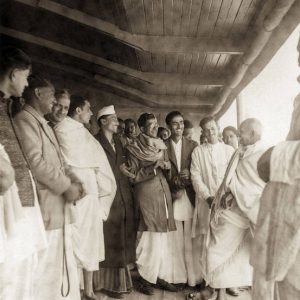
Though Gandhi and Kasturba wrote many letters to each other, they did not always receive them while they were in prison. Most of Gandhi’s letters have survived thanks to Mahadev Desai’s diary. Unfortunately Kasturba’s letters to Gandhi have not survived, denying us an opportunity to know her prison experiences first-hand. Gandhi urged Kasturba not to worry about not receiving letters.
You are getting worried about not receiving any letter from me, but I have already written three. One I sent to the Ashram address. This is the fifth letter I am now writing to you. We must realize that we are both prisoners. What would we have done if there was no permission to write to each other? To worry about such things is useless. I am quite well. I am now taking milk, bread and vegetables. Vallabhbhai and Mahadev are also all right. I understand that you are feeling weak. I have not received any letter from you. Write to me in detail.
[July 27, 1932]
As the date for release of Kasturba neared, he wrote a letter to her warning that meeting him might not be easy:
You will soon be released now. But you will feel unhappy that you cannot see me. I also feel unhappy. I may feel tempted to relax for your sake at least. But you also will agree that it would not be proper for me to do so. We have become what we are through self- sacrifice. You should, therefore, show patience. Write to me in detail.
[August 20, 1932]
Another jotting from Mahadev’s diary gives an indication of Kasturba’s state of health at the prison:
‘Bapu gave his letters to Ba and Kaka Kalelkar to be sent to Advani. About Ba he said, ‘She is said to have lost 16 pounds in weight, but it must be an exaggeration, as in that case she would be reduced to a skeleton.’ The Major said it might be true, for Advani had written to Doyle that her weight was going down and she refused to take more butter though pressed to do so. Doyle replied that they could not compel her in the matter and should do what they could as medical men.’
[August 27, 1932]
(16)
Kasturba, when she was released, had no time to feel unhappy about not seeing Gandhi, or to worry about her own frail health. Gandhi had a shock in store for her, and the rest of the country, for that matter. On 18th August, he wrote a letter to the Prime Minister of England that he would go on a fast from September 20, 1932. The fast would be in opposition to the separate electorates announced for the ‘Depressed classes’ and the untouchability practiced by caste Hindus which led to this situation. He felt a ‘sudden shock was necessary’ to sting ‘the Hindu conscience’ of men like Madan Mohan Malaviya, the most prominent orthodox Hindu leader, and Rajagopalachari, the acting President of the Congress, both of whom had completed their prison terms and were outside. To win over Ambedkar, he was willing to propose twice the seats offered in the British Award, but they had to be elected by a general electorate and not a separate one, which he believed could split the society and result in bloodshed.
Gandhi commenced his fast on September 20th. Sarojini Naidu who was in the women’s section was to look after Gandhi. He was not as careful with conserving his energies as he used to be during his earlier fasts. Kasturba, whose sentence was soon to expire, was brought to Yeravda prison from Sabarmati prison on September 22nd. On seeing Gandhi she quipped: “Again the same old story!” She took charge of Gandhi’s nursing setup. During his earlier fasts, regular massage had brought him relief. ‘This time he showed no interest in massage. It was was only when Kasturba Gandhi arrived that he permitted any massage being given him, if only to please her.’
The fast moved people of all sections to talk, act, agree, compromise and arrive at the Poona Agreement. The government had also agreed. Andrews and Polak in London were expediting the release of an official statement. Rabindranath Tagore arrive on the 26th September from Calcutta: “I have come floating on the tide of good news. I am so glad that I have come and that I have come in time,” he said. At 5.15 p.m., while the Poet sang from Gitanjali, and Gandhi’s leprosy patient, Parachure Shasti, recited verses, and the 200-strong crowd sang ‘Vaishnava janato’, Kasturba handed Gandhi a glass of orange juice, and broke his fast.
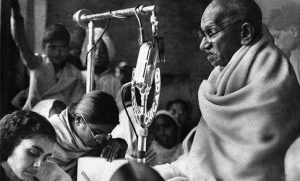
On 29th September, orders came from the authorities withdrawing all special facilities offered to Gandhi during the fast. Kasturba collected her belongings to move to the women’s section of the jail. She was fighting back her tears. Mahadev Desai wrote: “This evening Ba had to go. It was very difficult.” Gandhiji told her, “Do not keep the jailer waiting. Go immediately, now.” Kasturba was making soup for Gandhiji and she wanted to feed him the soup before going to her cell. She said to Gandhiji, “All right then. Avajo. I am going.” Her eyes brimmed with tears. Gandhiji lightly patted her cheeks and said, ‘Either I will come or you will. We cannot worry about it. Is it any less that we could stay together for so many days?” [*Avajo – ‘Come again’, a farewell term in Gujarati]
The next day she was released, five days in advance, and allowed to stay with her husband during the day. She was soon back in Sabarmati.
‘Kasturba went to Madras in December 1932. She was received at the station by a large number of people and profusely garlanded. In the evening a public meeting was held in Triplicane on behalf of a number of associations including the Madras Harijan Sevak Sangh. Kasturba represented Gandhi and from there went on a tour of the region to plead for the rights of Harijans and appealing to her audience to remove all disabilities against them.’
She was arrested again in February when she held a conference of women in the Ras village. About hundred local women had assembled to hear her. As they started walking in a procession, they were stopped by the police. Kasturba and the six women were taken into custody while the other women dispersed. “Ba and Mira are together in the Sabarmati prison, and so far as I am aware, they are keeping well,” Gandhi wrote to Ada West on 24 February 1933.
To Mira, Gandhi enquired with concern about his wife:
You had Mridula in your party. I hope she is quite well. She was not quite strong and healthy. Ba should look after her jaws. Does she wear her teeth? Does she take enough exercise? Does she do any reading herself? Does she get weekly letters or fortnightly? I know last time she did not get several of my letters. I do not know what happened to them. This time I am anxious that she should get my letters. So far as I am aware prison authorities had not withheld her letters.
To Kasturba, who must have fussed about Harilal, he wrote, “Why do you worry about Harilal? He will not write. If God suffers his drunkenness, what can we do? God will reform him when He wills.”
To Gangabehn Vaidya who seemed to have mentioned that Mira was criticising about Kasturba, he sprang to her defence:
For what was Mirabehn criticizing Ba? The latter is full of faults, no doubt, but her devotion is immeasurable. There can be no doubt that Ba is covering herself with glory. Her faults are overshadowed by her firmness of mind.
On 30th April, 1933, Gandhi intimated the Home Secretary that he would undertake an unconditional 21-day fast from 8th May 1933, ‘for reasons wholly unconnected with Government and solely connected with Harijan movement.’ He said in a statement, ‘it is a heart-prayer for the purification of self and associates, for greater vigilance and watchfulness.’ On a positive note, he declared, ‘I have no desire to die. I want to live for the cause, though I hope I am equally prepared to die for it.’
Gandhi received pleas to drop the fast from unlikely quarters. General Smuts sent him a telegram through the government representative.
“May I appeal to you most earnestly to delay your announced fast? Your work for removal of untouchability has already achieved a measure of success which exceeds highest expectations. With patience you may yet carry complete accomplishment of the greatest reform of our time. Moreover, India stands on the threshold of a new period which makes your wise guidance in future more essential than ever before. Endangering your life might lead to a dreadful calamity and an irreparable setback at the most critical moment. I appeal for old friendship’s sake and for the great causes you have championed so successfully.”
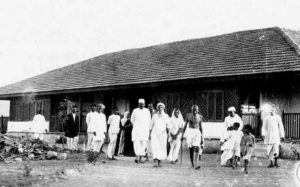
Harilal Gandhi wrote to him from Bombay, “Your fast has posed a question for all, ‘what is my dharma?’ I undertake to do anything you would ask me to, but please do give up the fast” A delighted Gandhi sent him a telegram,
“Your letter touches me. If this fast means your return to pure life it would be doubly blessed. See me. I shall try guide you. God bless you.”
Coming barely seven months after his earlier fast, this announcement must have left Kasturba shattered. She was still in prison at that time, along with Mirabehn. Mira sent a cable on her behalf:
“Ba wishes me say she greatly shocked. Feels decision very wrong but you have not listened to any others so will not hear her. She sends her heartfelt prayers. I am stunned but know it is the voice of God and in that sense rejoice even in midst of anguish. Deepest prayers. Love.”
He immediately cabled back:
Tell BA her father imposed on her a companion whose weight would have killed any other woman. I treasure her love. She must remain courageous to end. For you I have nothing only thanks to God for giving you me to me. You must prove your bravery by sustained joy over this newest of God’s missions for me. Love.
– Bapu
He later wrote to Kasturba citing the Gita in his favour, and concluded his letter with the line, “You should, therefore, understand that He who has prompted me to undertake this fast will enable me to complete it.” He had sent this letter along with a letter to Mira, to whom he had written, “I see what agony you are going through. I knew Ba would be brave. But your joint telegram and your letters have already begun to provide me spiritual sustenance for the pilgrimage. If you want me to come out victorious in the struggle of the spirit with the flesh, you too have to share in the struggle. I know how agonizing the effort is for you but I know too you will come out triumphant and help me to be triumphant too. But what is our triumph? As you have rightly begun your letter and perhaps I wrote the heading of my article just when you wrote those words there—not our will but His will be done.”
Gandhi started this fast as scheduled on the noon of 8th May. In the evening, the government decided to set him free. Gandhi immediately shifted to ‘Parnakuti’, Lady Thackersey’s bungalow, to continue the fast. Devadas and others were there to nurse him.
A frantic Kasturba sent him a telegram, “It appears from papers prisoners not to be released. I therefore ask your permission to apply Government for two months leave that I may come to you. Very anxious. Wire reply. Mira sends love. She is finding peace courage in prayer.”
Gandhi, as expected, refused. “Read your wire. Having lived with me over fifty years you should be brave and not apply. Am quite well happy. May God give you courage faith peace. Glad Mira happy. Love.”
Kasturba Gandhi was, nevertheless, released from Sabarmati Jail on May 13, 1933. She headed straight to Parnakuti. Mahadev Desai noted, ‘Ba is quite happy and giving all her time to Bapu nursing him and massaging him and preparing his feeds with all her devoted and loving care. The fast ended without much trouble and they stayed back for recovery.
On 16th June 1933, Devadas and Lakshmi were married at Parnakuti.
After failed attempts to resume talks with the Viceroy, Gandhi got ready for civil disobedience again. In what could have been a possible move to avert seizure of the ashram by the authorities, Gandhi disbanded the Satyagraha Ashram, painstakingly built, and nurtured with love, over 16 years. He reassigned as much as he could to other organisations for public use. He told the Hindu, “The disbandment of the Ashram would mean that every inmate would constitute a walking ashram, carrying with him or her the responsibility for realizing the Ashram ideal, no matter where situated, whether in prison or outside.”
On 31st July 1933, he marched with Kasturba, Desai and others to the Ras village in Kheda, where many peasants had lost their lands. They were arrested again and moved to Sabarmati Prison. Gandhi and Desai were soon sent to the Yeravda prison. They were released under the condition of staying in Poona. When they refused, they were rearrested and sentenced to jail for one year. Most Congress leaders went back to jail. Devadas, just a few weeks after his marriage, also went to jail. Kasturba Gandhi and Durga Desai were sentenced to six months’ imprisonment.
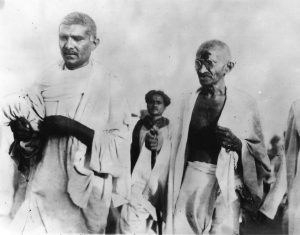
When he was denied facilities for resuming anti-untouchability work from the prison, Gandhi went on yet another fast on 16th August. He declined an offer of conditional release but was moved to Sassoon Hospital on 20th August. Before that, there was a meeting with Kasturba for 15 minutes. Mahadev Desai wrote:
Ba was unchanged. Ocean filled with pain must have suppressed her heart, but her face was serene. Bapu had taken enema and was lying on the cot. She did pranam to him and placed her head on his chest. Tears filled my eyes, but her eyes were dry. She smiled and said: ‘So. You started it again! When the jailer and the superintendent asked me to come over I thought there was no need to decline and therefore I did not say no I was brought here. I had a bath and was ready to come to you. The superintendent said that he had received no order to keep me with you because you are in the European Ward. He told me that he would give me fifteen minutes with you. I told him that I should not have been brought here. I had not asked to be brought here.’ Bapu was overjoyed and kept nodding his head in assent.
Bapu asked about other ashram women. Ba gave news of all…At the end of the visit Bapu wrote: ‘Be brave. Do not come for fifteen minutes. They can send you back if they want. Give my blessings to all the women. God will protect me.’ Ba said: ‘That He will do. But, break your fast soon.’ After Ba went Bapu wrote: ‘Ba’s courage is limitless.’ It was as if Ba poured life into him, infused him with new blood. She filled him with new hope and faith. Ba’s courage is comparable only with ancient examples like Draupadi. The roots of it are in Ba’s unprecedented love and devotion for her husband and her brahmacharya.
During the next three days, his condition worsened and the authorities feared that he may not survive. Gandhi himself felt so. He wrote later in a letter, “On the 23rd night after the nausea, I felt I would not survive for long, that I could no longer battle with death. On the afternoon of the 24th I even gave away whatever I had with me.” ‘He said that not even water should be administered to him. Ba was standing beside him. He told her to leave his bedside. Poor Ba stood there stupefied.’
But, thanks again to the efforts of Andrews, who, behind the scenes, had been pleading with the Governor of Bombay, Gandhi was released unconditionally. Andrew rushed in a car with the order to the hospital and took him to ‘Parnakuti’. Gandhi survived and recovered. Kasturba, Mirabehn and Prabhavati looked after him. Mahadev was sent to the Belgaum prison. Gandhi wrote, ‘It is a matter of no joy for me. Possibly it is a matter of shame that I took my comrades to prison and came out of it by fasting.’ He then chose not to indulge in any civil disobedience till the period of one year sentence got over. He moved to Wardha for taking rest, and started his preparations for the Harijan Yatra, planning to travel all over the country.
(17)
In October, Prabhudas Gandhi, son of Chhaganlal and Kashi Gandhi, and who had grown up in Gandhi’s ashrams from the Phoenix days, got married to Amba in the presence of Gandhi and Kasturba. Gandhi made a sari for Kasturba and the bride with yarn spun by him.
The next day, he wrote to Premabehn Kantak, “Ba is getting ready [to go to jail].” He confided to Vallabhbhai Patel, “This time she is very much agitated. She is restless no doubt. But she will go [to jail]. She is convinced that that is the only right course.” He sought the help of Manibehn Patel, his daughter, who was also set to go to prison:
Now about Ba. If I had had time, I would have explained the point more clearly in that letter. Ba’s mind has weakened. She wants and yet does not want to court arrest. Deep down in her heart she knows that it is her duty to do so, and cannot forsake that duty, but she does not like to go as I am out. I have not put any pressure. I have left her free to do as she wishes. What I wanted to say was that you should urge her and strengthen her resolution to do her duty, for she believes in you and loves you. Anything I might say is likely to be regarded as an order and might kill her individuality. I, therefore, tell her nothing. But even my silence is interpreted by Ba to mean that I want her to go.

Prabhudas Gandhi
Kasturba did choose to go to prison, overcoming her overwhelming wish to be with Gandhi on this important and extensive tour.
On 25 November 1933, Kasturba Gandhi wrote to the home secretary of the Government of Bombay:
Dear Sir,
When in August last my husband (M. K. Gandhi) went on a fast in prison, I was serving my own term of imprisonment as a civil resister; and in order to enable me to attend upon and nurse him, the Government, as is their wont on such occasions, did me the courtesy to discharge me from prison. My husband having now fairly recouped his health, and having resumed Harijan work in pursuance of his vow, I feel that I do not require to attend upon him further and that as a civil resister I may not stay away from duty any longer. I propose, therefore, to resume my work, and, to begin with, I intend to proceed to the village of Ras in the district of Kaira in order to associate myself with the civil resister sufferers in their woes and share their privations to the best of my abilities. I hope to leave Ahmedabad for Ras on 28th November 1933.
Yours faithfully.
Kasturba Gandhi
Guha opines that the letter could have been drafted by Mahadev Desai, Devadas or Gandhi himself.
Kasturba was arrested with Manibehn at Nadiad. Guha narrates the hearing at the court:
In court, Kasturba answered questions in her native Gujarati. The archival record has the English translations, these made by the magistrate for his superiors in Bombay. Kasturba gave her caste as ‘Bania’, her occupation as ‘Deshseva’, this accurately rendered in English as ‘in the service of the nation’ (no doubt to the embarrassment, or anger, of the British officials who were to read it). She wanted, she said, to go to Ras to study at first-hand the condition of the agriculturists there, whom she had heard were being ‘greatly harassed’ by officials. Asked whether she intended to preach civil disobedience in Ras, Kasturba answered that the breaking of unjust laws was her dharma. As her husband had recovered his health, she wished, she told the magistrate, ‘to undergo the remaining period of my former sentence which had remained unexpired’.
Kasturba was sent to Yeravda prison this time to serve the remainder of her six month sentence. “I heard about Ba only yesterday after we had arrived here. I am glad,” Gandhi wrote to Patel on 4th December 1933.
He had already started on his Harijan yatra from November 7, 1933. The tour plan was worked out by Thakkar Bapa, General Secretary of Harijan Sevak Sangh. It was to last nine months till the end of July 1934. All provinces were to be covered. Despite expedient changes, the tour concluded only a few days late on 3 August 1934.
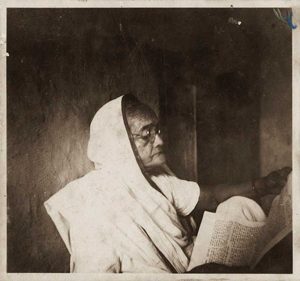
For six of those nine months, Kasturba was in prison. Gandhi, despite his hectic travel, wrote 22 long and loving letters to her during those six months. His letters contained updates about his travel, friends and family, and a spiritual discourse. It was Kasturba who asked him to send a discourse every week. Through these written discourses, she might have thought, she wouldn’t miss his prayer meetings. He wrote to Patel, “Devdas visited Ba. He is full of praise for her courage. She is of course harassad a little. But without harassment there would be no pleasure in being in jail.” The patience with which Gandhi describes places and events are quite revealing. He sometimes wrote like he were writing to a child. For instance, he writes from Coonoor: “Today we are on a mountain in Madras. Its height is the same as that of Almora. The greenery is probably more beautiful, but we cannot see snowcovered mountains here. The Himalayas are very-very far away.” These letters are also indicative of how large their extended family was. He gives her news about the death of Santok’s [Maganlal’s wife] mother, and Kusum, Harilal’s grand daughter. He gives her news about the pregnancies and then the child births of the two Lakshmis – one their adopted daughter and the other, Devadas’ wife, and Nirmala, Ramdas’ wife. “Nimu and Lakshmi have given birth to daughters. The mothers and the daughters are quite well. Now the delivery of Bardoli Lakshmi is awaited,” he wrote in one letter, and added in the next letter, “A son has been born to Maruti and Lakshmi.”
Gandhi reserved the customary shock for her till his last letter, which he wrote on 10th May, 1934, from Chandanpur, near Puri:
We decided the day before yesterday that from now on I should tour on foot. One cannot propagate dharma by travelling in trains or cars, nor in bullock-carts. That can be done only on foot. The local leaders and Thakkar Bapa finally agreed. We started the tour on foot the very same day. This has given me new strength. Yesterday we covered more than eight miles, but I felt no fatigue.
On May 22, Gandhi wrote to Vallabhbhai, “Ba has been released. She will first go to Wardha and Delhi and then join us somewhere.” He later updated him on June 25, from ‘Parnakuti’, Pune, “Ba has joined me. Her health is fairly good. She is quite happy.”
On the same day, in Poona, an unknown assailant threw a bomb at a car thought to be bringing Gandhi and Kasturba for a talk at the Municipal Building. The occupants were injured. Gandhi’s car reached three minutes after the explosion. “Let those who grudge me what yet remains [of my life] know that it is the easiest thing to do away with my body. Why then put in jeopardy many innocent lives in order to take mine which they hold to be sinful?” asked Gandhi during that meeting, after he came to know of the attack.
During this tour, Gandhi had covered 12000 miles, including 156 miles on foot, and collected about ten lakh rupees.
Before the year was over, Kasturba had to contend with two more issues. The first was another fast by Gandhi. At Ajmer, on the 5th of July, a sanatanist opponent Pandit Lalnath had sought Gandhi’s permission to speak on stage and present the sanatanist view. Gandhi had agreed. Before the meeting, Lalnath had appeared with his supporters to do a black flag demonstration. Despite Gandhi’s exhortations to ensure that the demonstrators be protectors, they were attacked and Lalnath received a cut on his head. When he rose to speak at Gandhi’s invitation, the audience interrupted him. Gandhi, upset by these events, said the Harijan movement was a religious one with no room for intolerance and violence, and he had to undertake some sort of penance. The next week, he announced that he would fast for a week from August 7th to August 13th. He told a press conference at Karachi on 11th July:
“You can influence the mass mind not through speeches or writings but only by something which is most well understood by the masses, that is suffering, and the most acceptable method is that of fasting. […] My lot has been cast with the masses, and I have always to take work from and through them. The only language they understand is the language of the heart, and fasting when it is utterly unselfish is the language of the heart.” […]
Friends who at the present moment are physically near me have realized the necessity of the fast.
Does it include also Kasturba ? (asked a reporter)
Yes. It has been my rare fortune that in all such matters she has never worried me, never argued with me, and has allowed me to have my own way, although she has felt the distress. Therefore although she is my wife, I have not hesitated to say that she is one of the bravest women I have ever met in this respect.
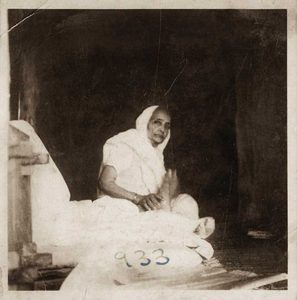
The second issue was the health of Ramdas. ‘Yes, Ramdas, one may say, is fairly ill,’ wrote Gandhi to Kanti. ‘Ramdas has been suffering. He needs a lot of money for medicines, etc. How can I let him accept such a large amount as gift? I hardened my heart, therefore, and wrote to him today saying that he must not accept more than Rs. 100 every month, no matter whether he lived or died in consequence,’ he wrote to Patel.
The father could harden his heart but the mother gave her all to save Ramdas. She spent many months tending to him at Ahmedabad, and later Wardha, along with Hiralal Sharma, a nature cure specialist. Finally, Gandhi wrote to Devadas, “Ramdas is recovering-gradually. Let us hope he gets back his health. Ba keeps him company by staying with him. He is at Jamnalalji’s bungalow. It may be said that I am treating him; but in fact he is treating himself. He has started taking eggs. They are unfertilized and therefore there is nothing wrong in taking them. I receive letters from Harilal. At present I am meeting his expenses. He is holding out great hopes and I too am hoping.” Gandhi was trying to arrange for Ramdas to travel to South Africa and make a career for himself there, believing, ‘your medicine will be your work’. But Ramdas continued to lead an unsettled and uncertain life, till he started working for the Tatas.
As for Sharma, who was taking care of Ramdas, Gandhi offered to take care of his young family, while he went to the West. ‘If I am prepared to send you, it is only to disillusion you about the West. True nature cure is to be found in the villages. All the knowledge the West has to offer can be got from the books. The rest is to come only from the villages. And in the end the service we wish to render will be to the villagers.’
There was another patch-up with Harilal in February 1935, when he came to live with Gandhi and Kasturba at Wardha for a couple of months. While Gandhi was still ready to believe his son, Kasturba was skeptical but delighted to have her son back. But, their hopes were short-lived and after two months trouble was brewing. A marriage with the German-Jewish woman, Margarete Spiegel (Amala), who had been staying with the Gandhi family, was considered, but did not progress. Gandhi said, “I understand your problem. You don’t wish to deceive yourself or me. You still crave for sex pleasure. […] My difficulty is this. How can I, who have always advocated renunciation of sex, encourage you to gratify it? How can I help you to do so? I can tolerate your remarrying. But how can you carry on your search for a wife while staying with me?” Gandhi went to great lengths to gain back Harilal; he even allowed him to smoke 3 cigarettes a day. Harilal left for Rajkot and was put under the care of Narandas. But when he finally ‘threw off all self-restraint’ and seemed to have ‘gone off the rails’, Gandhi admitted to Narandas, ‘For the present Harilal may be considered as lost to us.’
The next year, he converted to Islam, and Kasturba wrote those public letters to him and his Muslim friends. She was at Delhi at that time. Harilal did not believe she had written those letters. Gandhi himself was surprised and ‘glad to learn that the whole line of thought has been Ba’s own. She certainly has that power, and the letter is indeed a good one.’
(To be Continued…)
